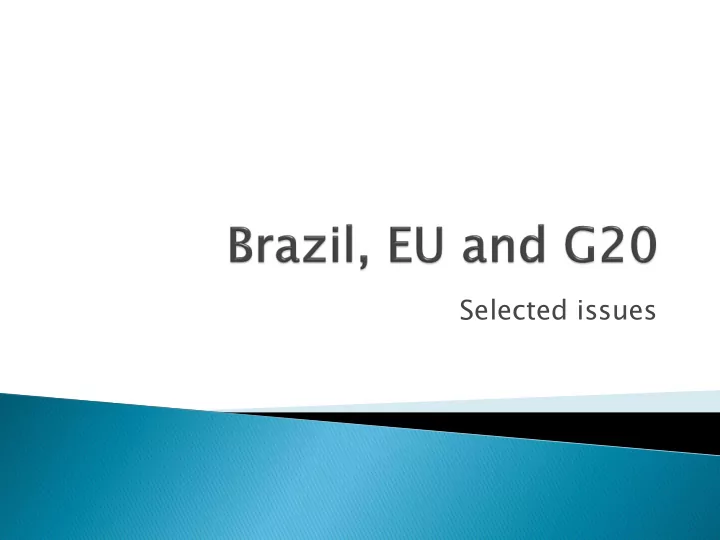

Selected issues
I. IMF resources and reform II. Financial Transaction Tax III. Tax havens
PUZZLE 1: Why did Brazil agree with the 2010 reform (incl. quota doubling, quota realignment, Board reform)? Brazil’s quota from 1.78 to 2.32%, but GDP blend share is 2.65%. Calculated quota share would be larger than 2.65% if quota formula took into account more GDP PPP (Brazil: 2.9 %), and population.
Overall net shift to emerging and developing economies (EMDCs) = 2.6 % (South Korea and Singapore included). Executive Board : “minus 2 advanced EU seats” (full -time equivalent) – not secured yet that these FTE seats go to EMDCs US veto intact – European Managing Director
Still, Brazil committed about 13.5 billion USD to New Arrangements to Borrow (NAB) (= Russia, India) This might be considered as a disappointing deal for Brazil. Theoretically, Brazil could have “walked away”, by not agreeing and not contributing to the NAB.
No agreement within BRIC to take tough stance. Brazil and India most vocal in criticizing status quo. China patient and “peaceful rise.” Partnership between US and BRICs on IMF reform (at the expense of EU). Brazil responsible player at zenith of global financial crisis, attached to IMF. Yet, Brazil contributes only 2.38 % of NAB (same order of magnitude as Belgium, Netherlands, Switzerland).
Walking away would have been very symbolic, but only symbolic. EU countries could compensate for non-participation by BRICs. Moment of truth has yet to come: revision of Quota Formula by Jan. 2013 and new quota review by 2014 = integral part of 2010 reform package. Managing Director: BRICs divided …
Brazil is already in Executive Board ! – the stakes have to be put into perspective. Agenda of Brazil in favor of other EMDCs ?
IMF asks more money, pledges up to $430 billion been made. But BRICs make concrete new pledges conditional upon full implementation of 2010 reform, including quota formula (but nothing concrete on formula agreed yet). Timely implementation of 2010 package jeopardized by legislative process in US.
Unclear how Board reform will work out – what should Europeans do ? ◦ Possibility that small EU countries rotate with each other or with “not advanced” (i.e. transitional) EU/European countries. ◦ Rotation Belgium with Turkey ? (unlikely) ◦ Small EU countries and Switzerland disappear from Board ? ◦ Rotation among large EU countries or with small European countries (unwilling…) ◦ Exit of Belgium, Netherlands, and the like is not only possible option and not desirable. IMF is an official multilateral institution, based on free constituency formation, and should not be run by the G20.
PUZZLE II: Where is the spirit of 2004, when Presidents Lula and Chirac together campaigned for the Tobin tax ?
2002: Disappointment about 2002 UN Conference “ Financing for Development” in Monterrey. 2004: Creation of Leading Group (Groupe Pilote) on Innovative Financing for Development (not only Tobin tax), led by Pres. Chirac and Pres. Lula. (sort of “ coalition of the willing ”) Moment of hope for African countries, civil society worldwide, etc.
Global financial crisis new momentum in EU (in particular geared at letting financial sector pay for the crisis) At G20: Financial Transaction Tax for development and climate finance on the agenda – campaign led by Pres. Sarkozy (incl. Bill Gates report).
At G20 Cannes summit Nov. 2011: Pres. Sarkozy announces support from Brazil, Argentina, South Africa and others. Pres. Roussef : “We are not opposed if others agree”. More forceful endorsement will be needed Brazilian policies and debate on domestic FTT, but outside global/G20 framework.
Domestic FTT debate is difficult. Position of financial establishment ? Little momentum for global FTT in emerging economies across the board – in EM’s other experience with crisis and role of their financial sectors therein.
Global financial crisis downward pressure on official development aid, but growing demand for additional finance for climate mitigation and adaption. Not many creative plans on the table. After years of struggle some momentum in the Euro area at the highest level, for this highly development-relevant agenda. But large EMDCs lukewarm… Europeans somewhat isolated.
Stronger partnership between EU and Brazil on combatting tax havens, along with others. Evaluation in OECD-led Global Forum. ◦ “Weak” OECD standard on information exchange upon request written stone ? ◦ Global and Brazilian support for EU model of automatic information exchange ? ◦ Support by India ◦ Development-relevant agenda
Brazil emerging, assertive, but (too) pragmatic player ? EU conservative on IMF reform, but isolated in certain progressive, development-relevant agendas ? Other examples: G20 and commodities; G20 development working group and aid.
Recommend
More recommend